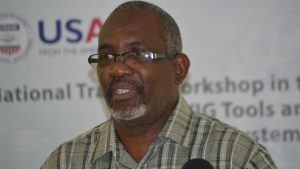 The Government of St. Kitts and Nevis has positioned itself to address some environmental challenges, in particular, global warming, in an effort to improve informed decisions on issues like climate change, said Alistair Edwards, Permanent Secretary in the Department of Environment.
The Government of St. Kitts and Nevis has positioned itself to address some environmental challenges, in particular, global warming, in an effort to improve informed decisions on issues like climate change, said Alistair Edwards, Permanent Secretary in the Department of Environment.
Speaking at the opening ceremony for the National Training Workshop in the Use of Climate Models for Decision Making on Wednesday, April 19, the permanent secretary said that climate change affects everyone, therefore, the Department of Environment “will continue to undertake various adaptation and mitigation actions to ensure that St. Kitts and Nevis builds its resilience to reduce the impacts on climate change.”
Mr. Edwards said that St. Kitts and Nevis is very vulnerable to adverse impacts of climate change, as it can be seen in a number of sectors across the federation.
“Sectors such as tourism, agriculture, water, and health and by extension the entire nation, have already been impacted in one way or another by these adverse factors. In response to the current projects it impacts, it is important that St. Kitts and Nevis undertake various initiatives that will reduce risk and the risk of our natural assets from climate change,” said the permanent secretary, while adding that St. Kitts and Nevis recognizes that climate change impacts the sustainability of not only the federation, but also the region.
“For a country like St. Kitts and Nevis, our critical infrastructure lies on coastal zones. Therefore, it is immensely important that measures and actions are put in place to protect our beaches and coastlines. We must implement measures that ensure food security, public health, the availability of fresh and potable water are not impacted,” he said.
PS Edwards made specific mention of the national training workshop, noting that the Department of Environment sees it as an ideal opportunity to build work that has already started. He explained that adaptation is critically important to St. Kitts and Nevis, and as such, it should be made a priority.
“We need to identify and implement adaptation measures in a collaborative manner. We need to ensure that the decision makers have access to the most effective tools and methods that can help them integrate climate change into planning and investment processes,” said Mr. Edwards. “The approach of tackling adverse impacts of climate change requires the support of all us. Our planet is dependent on it and our very existence is depending on it.”
